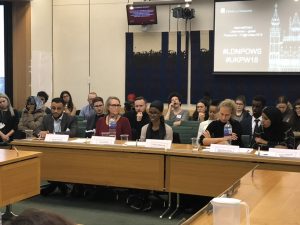It all began in 2014 when Dami realised that, as a migrant who travelled from Nigeria to the UK as a child, she wouldn’t be able to apply for university funding like the friends she’d gone to school with.
Rules at the time stated that only people with indefinite leave to remain in the UK could access funding for Higher Education – a process that would take her ten years to complete.
“Most people just didn’t know they were undocumented. They came to the UK at such a young age and assumed their parents would have handled those things,” she said.
Dami became involved in the Let Us Learn campaign led by Just for Kids Law and her story – and those of her fellow campaigners – became central to their strategy.
“We quickly realised that if we didn’t tell our stories, someone else would tell them for us,” she said.
“There were times when we were extremely frustrated, and we did have conversations about being more disruptive or radical but we knew [because of our immigration status] that we were at risk with everything we did, and we just didn’t have that privilege, so it was important to keep a level head and go for the long fight.”
They found support from United We Dream – the largest immigrant youth-led network in the US – and from Steph Wong, then at Citizen’s UK, and now Director at Act Build Change.
“We did rigorous storytelling training and we saw how effective it was. It was the first time so many young migrants had come out and told their stories.”
What they did
The United We Dream formula focused on teasing out three aspects of Dami’s story: the challenge she faced, the choice she had to make, and the outcome of that choice.
Alongside ‘challenge, choice, outcome’, her story was also structured around the ‘public narrative’ framework developed by the community organiser and academic, Marshall Ganz. This encourages the storyteller to develop their story of:
Self (how they were called to public leadership);
Us (the shared values and experiences of the storyteller and the audience); and
Now (strategies and actions to move forwards).
These frameworks exist to help the storyteller to connect with audiences but Dami stresses that it is always up to the individual how much they choose to share.
“They made it clear from the beginning that you had complete control over what goes in the public realm and what stays private,” she said.
At Just for Kids Law, she and other young migrants began by telling their stories to each other during small monthly gatherings.
Dami said: “You want to share them with people you trust first. There were a lot of tears. People shared stories about deportations, self harm and so many deep issues. This is how we grew our capacity as storytellers.”
Those who were ready then began sharing their stories more widely; with the media, at events and with politicians.
“It became part of our DNA, it’s just what we did.” she said.
“You have to keep continually crafting your story for different audiences. With politicians from the party in power we tried to push their agenda using a positive framing around aspiration and young people being the future.”
“In 2016, a young migrant, Ijeoma Datha-Moore, had one minute to speak at the London Mayoral Assembly for 6,000 people. We crafted her story again and again to get it to time. She was the only person during the three hour event who got a standing ovation.”
What happened
The Let Us Learn campaign had a big win in 2016 when the law changed to allow people who had lived in the UK for at least half their life, and with limited leave to remain for three years, to access student finance.
In 2019, Dami co-founded We Belong, a charity spin off from Just for Kids Law, focused on fighting for the rights of young migrants, alongside Chrisann Jarrett. We Belong continued campaigning and had another win in 2021 resulting in routes to settlement for young migrants being cut from ten to five years.
“This was a huge win,” said Dami. “We had dreamt about it for years but were curious if we could reach this goal.”
“The overwhelming relief that washed through me when the government finally announced that they recognised our long fight for equality and were willing to treat us like EU citizens and others on spousal visas was beyond real.”
“I cried and cried and then laughed and laughed. There’s no way to describe what this success felt like except feeling like you were finally heard.”
Thanks to the changes she campaigned for, Dami has now left We Belong and is studying for a degree in Psychology. She’s also a member of the board at Act Build Change and at Larger Us.
What you can do
We asked Dami for her advice to people who want to help others to share their stories as part of a campaign.
Start by talking, and be patient. “This is usually face-to-face. Ask them what story is it that they want to get out there? I worked with a young man consistently over three weeks and he finally got to the stage where he said he wanted to talk about his sexuality and its links to immigration.”
Ask them to write everything down. “Anything that comes to mind. It doesn’t matter if it has a beginning, middle and end, just ask them to get everything they want to say onto the page.”
Start to apply some structure. “Once everything is written down, start looking for the challenge, choice and outcome. Start honing the story and thinking about the beats that need to be hit.”
Give them space to practise. “Once you have the story, give them an opportunity to tell it to you and maybe a couple of other people. It might be written on paper but until you actually speak it, you never know what it’s going to sound like.”
Invite them to share in a friendly setting. “Find a space where there’s no judgement and with people who understand because they’ve been there too.”
Be strategic when preparing to share publicly. “You might need to hone the story again depending on your target audience, especially for those who may not be as receptive or non-judgemental. There will always be people who don’t agree with you but try to be as authentic as possible and true to yourself.”
Protect the vulnerable. “When I was sharing my story publicly, nothing could come back on me because I had limited leave to remain. We didn’t put anyone without an immigration status up in front of the media because it could have led to their detainment and deportation.”
Look after your storytellers. “When speaking publicly, always go in groups of two or three. Help people be as prepared as they can be. We always had long debriefs afterwards. It’s very important to know if they felt safe and secure in the space they were in? Did they get to say what they wanted to?”
If you want to find out more about the role of storytelling in campaigning take a look at the resources and organisations listed below.
Resources
More on how to use the ‘Challenge, Choice, Outcome’ and ‘Story of Self, Us and Now’ can be found in Telling Stories on page 9 of Organizer’s Handbook, as recommended by United We Dream, adapted from the work of Marshall Ganz by New Organizing Institute.
You might also find this worksheet on how to develop your story of ‘Self, Us and Now’ from Digital Access to Scholarship at Harvard helpful. It’s adapted directly from Marshall Ganz’s 2009 working paper on public narrative.


